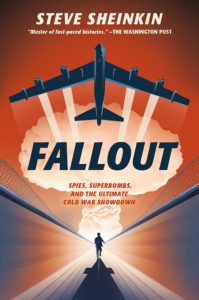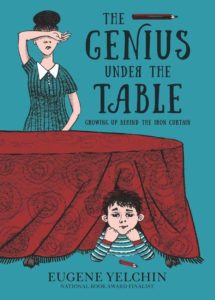Our annual Newbery Buzz Series is a series we run each January in which we discuss books with “Newbery Buzz.” That is, books we’ve heard lots of “buzz” about on various children’s literature websites through the past year.
No one knows which books have real “Newbery Buzz,” which books the actual Newbery committee is seriously considering, but we think it’s valuable to take a closer look at the books our broader American culture is discussing. This year is the 100th anniversary of the Newbery Medal, so whoever wins this year will have a unique place in the canon!
Nonfiction Contender? Fallout by Steve Sheinkin

Betsy: Subtitled “Spies, Superbombs, and the Ultimate Cold War Showdown,” Fallout is every bit as readable and gripping as a fictional spy thriller. Megan, I hear that you had a hard time wresting this book away from your 14 year old son! That’s certainly a vote in its favor.
Like our children, we didn’t live through the Cuban Missile Crisis, but the time period is definitely closer to our own growing up than teens today. What were your first impressions of this book?
Megan: Almost too many “accidents” to be real. A paper boy finds a nickel with hidden code to start with? If it weren’t true, it would be an implausible movie script…but it really happened!! And the incredible timing of one man who “happened” to be in the right submarine at the right time. That was all God, though the book doesn’t recognize him.
Betsy: Yes, those “accidents.” Right up until the very seconds at the end. Makes me, as a Christian, immediately think of Providence and the Lord at work behind the scenes—there’s no way any single human had the ability to see all the details!
Megan: The writing is so good. Sheinken grips your attention from the beginning and carries it to the end. My son went on to read Bomb, and I want to read it, too.
Since we didn’t live through the 1960s, were there pieces that fell into place for you, Betsy?
The Cold War in Books Like Fallout
Betsy: I think I understood the urgency of the Cuban Missile Crisis afresh. I’d always heard of it, and I’m old enough to remember the Cold War and the Berlin Wall coming down. In fact, my family and I helped a missionary family in the USSR send out their newsletter. They essentially went undercover to be missionaries, changing their names and everything. Reading Fallout helped me understand why some of those tensions were in place, and also why the Vietnam War would have felt so important and urgent to so many. But what I took away most vividly were the tensions, uncertainties, and utter humanity of the leaders: Khrushchev, Kennedy, and the rest. I can’t imagine having to make such weighty decisions with so little information! (Or with such incomplete information)

What about you, Megan? How does this book show these political tensions compared with others you’ve read about the same events and time period?
Megan: Another book I recently read about the Cold War is a memoir titled The Genius Under the Table. It’s written from the perspective of a boy in Russia whose father is a supporter of communism and his mother loves the arts, but they’re Jewish, living under prejudice and the eyes of a KGB informant in their apartment building. It’s both humorous and poignant, sad but not hopeless. Fallout is about the world stage with big players. Genius is about the lives of ordinary people.
Betsy: That’s a really interesting comparison: the world stage v. ordinary people.
Megan: Speaking of ordinary families in the 60s, The Wednesday Wars was set during that time period, wasn’t it?
Betsy: Oh, that’s an interesting connection with The Wednesday Wars. Vietnam is really in the background in that book, not so much Russia. But there are similar political tensions at work behind the scenes for sure. If The Genius Under the Table is about ordinary people in the midst of the conflict, perhaps The Wednesday Wars is about ordinary people watching the conflict from afar?
One book that I think is so important is The Wall by Peter Sís. That book visually shows the influence of communism and how the culture in Eastern Europe changed as the former Soviet Union began to open up more to Western democratic ideals.
Does Fallout Have What It Takes?
Well, the million dollar question (or, at least, the shiny gold sticker question) is: Is Fallout distinctive enough to win a Newbery? Bomb got an honor, and I think Fallout is a very similar book. It’s much better than Sheinkin’s Most Dangerous, which came out a couple of years ago and is about the Vietnam War. The Newbery committee is made up of people living in our current time and place: perhaps a book that shows real people having to make decisions that affect the globe on the basis of incomplete information will tip the scales, right? What do you think?
Megan: I always wish that the ALA award committees would prioritize books that the readers they are intended for won’t be able to put down, rather than “distinguished contributions…blah, blah, blah.” I think that books that win awards should feature irresistible story-telling and sentence-crafting that deepens a reader’s appreciation of life and the world we live in. Unfortunately, that doesn’t always happen, and sometimes committee members are more interested in political and cultural factors or an elite literary approach that doesn’t appeal to most kids who just want a really good book to read.
Still, the committees can’t ignore Fallout with its intriguing prologue, complex characters (whether they’re famous or ordinary), abundant photos and documentation, and Sheinken’s skill in telling a real Story. If I were on all the committees, I would give this the Sibert award, a Newbery honor, and a Printz honor. It could certainly win a Newbery award, but I haven’t read as much fiction this year to know what else is in the running. I predict it will end up with multiple shiny stickers crowding on the cover.
Betsy: Ooh, I like the sound of that: a Printz honor would be great. And you’re right, this is a great contender for the Sibert Award. I think Fallout is certainly well-written and engaging enough to be in the Newbery lineup, but I’m not sure it will win the gold.
Readers, what do you think? Have you read Fallout? Are you hoping it wins a Newbery medal later this month?
For previous Newbery Buzz discussions this month, see:
- The Beatryce Prophecy by Kate DiCamillo
- The One Thing You’d Save by Linda Sue Park
- Gone to the Woods by Brian Paulsen
- Newbery Buzz Round-Up #1: DaVinci’s Cat, Playing the Cards You’re Dealt, Harry Versus the First 100 Days of School, and Black Boy Joy
- Newbery Buzz Round-Up #2: Starfish, Born on the Water, Too Bright to See, and The Legend of Auntie Po
Support our writers and help keep Redeemed Reader ad-free by joining the Redeemed Reader Fellowship.
Stay Up to Date!
Get the information you need to make wise choices about books for your children and teens.
Our weekly newsletter includes our latest reviews, related links from around the web, a featured book list, book trivia, and more. We never sell your information. You may unsubscribe at any time.
We'd love to hear from you!
Our comments are now limited to our members (both Silver and Golden Key). Members, you just need to log in with your normal log-in credentials!
Not a member yet? You can join the Silver Key ($2.99/month) for a free 2-week trial. Cancel at any time. Find out more about membership here.
2 Comments
Leave a Comment
You must be logged in to post a comment.


My 15-year-old son, who has enjoyed many of Steve Sheinkin’s books, told me I HAD to read Fallout! He handed it to me when he was done, and it was so good that I couldn’t put it down, finishing it in just a few days!
Us, too! In my opinion, it’s the best of Sheinkin’s books.